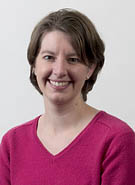
College hosts international conference on memory and knowledge
Bates College hosts the seventh biennial meeting of the Society for Applied Research in Memory and Cognition (SARMAC), an international conference on memory and cognition, Wednesday, July 25, through Saturday, July 28.
“The conference attracts international researchers who are interested in using rigorous experimental methodology to address problems derived from errors or biases in cognitive functioning,” says Associate Professor of Psychology Amy Bradfield Douglass, the Bates faculty member hosting the conference. Cognitive functioning is the acquisition and use of knowledge.
For example, says Douglass, “many of the researchers in attendance have been instrumental in helping the legal system learn how to maximize the collection of accurate information from crime victims or prevent mistaken eyewitness identifications.” This research has informed legal processes in the United States, Canada, the United Kingdom and Australia, she says.
According to Douglass, other SARMAC researchers have investigated recovered memories of childhood sexual abuse and the ease with which false memories can be implanted in people’s minds. This research, she says, has been highlighted in many court cases in which defendants are faced with “recovered memories” as the primary evidence against them.
In addition to a program of 35 paper sessions and symposia, scheduled keynote speakers include Norbert Schwartz, University of Michigan, who offers the conference’s opening address, “The intricacies of setting people straight: Metacognitive experiences in debiasing and public information campaigns.”
This talk on debiasing information examines the metacognitive experiences that surround learning information from a public information campaign. Metacognitive experiences, says Douglass, include things like the ease with which information comes to mind while thinking about a problem. How can those experiences influence people’s reactions to public information campaigns?
The three other conference keynote addresses are: Development of False Memories in Childhood: The Role of Emotion, Stress, and Maltreatment, by Mark Howe, Lancaster University; Violent Video Game Effects on Cognition, Affect, and Behavior, Craig Anderson, Iowa State University; and Autonoesis, Amnesia, and Social Influences: A Functional View of Memory,” by Suparna Rajaram, Stony Brook University.
Douglass’s own research interests include social psychology, with specific focus on the interface of psychology and law, especially eyewitness testimony. She also studies how variables in social influence cause distortions in memory.
Douglass chairs a paper session examining the “sequential method,” a presentation of photos to eyewitnesses one at a time. Witnesses must indicate, upon seeing each photo, whether it represents the culprit. If they indicate that it does, the identification procedure is usually terminated. If they indicate that it does not, the next photo is shown.
A large body of research demonstrates that this procedure reduces the incidence of false identifications. The sequential procedure is in contrast to the typical police procedure, called simultaneous, in which all photos are laid in front of a witness at one time. The witness can then compare the photos to each another before making an identification.
Recently, the state of Illinois undertook an extensive examination of the sequential procedure to determine whether to include it in all of the state’s jurisdictions. The report concludes that the sequential procedure inappropriately increased identifications of known innocent lineup members. However, several experts in the field (some of whom belong to SARMAC) have grave concerns about the validity of this study and its utility in providing information about the accuracy of the sequential procedure.
“I have testified as an expert witness in a case in which the Illinois data were held up as a reason to favor the simultaneous procedure,” says Douglass, “so it’s clearly had an impact in the legal system already.”




